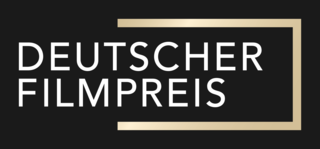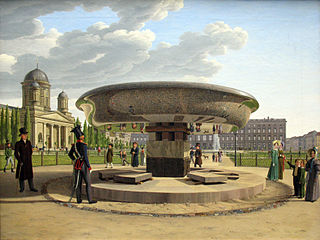
Johann Eduard Erdmann was a German religious pastor, historian of philosophy, and philosopher of religion, of which he wrote on the mediation of faith and knowledge. He was known to be a follower of Friedrich Schleiermacher, whom he studied under August Carlblom (1797-1877), and Georg Wilhelm Friedrich Hegel, whom he regarded as his mentor. Erdmann also studied the works of Karl Daub. Historians of philosophy usually include Erdmann as a member of the Right Wing of the Hegelian movement, a group of thinkers who were also referred to variously as the Right Hegelians (Rechtshegelianer), the Hegelian Right, and/or as the Old Hegelians (Althegelianer).

The German Film Award, also known as Lola after its prize statuette, is the national film award of Germany. It is presented at an annual ceremony honouring cinematic achievements in the German film industry. Besides being the most important film award in Germany, it is also the most highly endowed German cultural award, with cash prizes in its current 20 categories totalling nearly three million euros.

Tennis Borussia Berlin is a German football club based in the locality of Westend in Berlin.
Carl Erdmann was a German historian who specialized in medieval political and intellectual history. He is noted in particular for his study of the origins of the idea of crusading in medieval Latin Christendom, as well as his work on letter collections and correspondence among secular and ecclesiastical elites in the eleventh century. He is often mentioned alongside Percy Ernst Schramm and Ernst H. Kantorowicz as one of the most influential and important German scholars of medieval political culture in the twentieth century. His promising and remarkably prolific career was cut short by his death in the German army at the end of World War II.

The Cologne University of Music is a music college in Cologne, Germany. Founded in 1850, it is Europe's largest academy of music.

Aki Takase is a Japanese jazz pianist and composer.

Berliner Morgenpost is a German newspaper, based and mainly read in Berlin, where it is one of the most read daily newspapers.
Giuseppe Becce was an Italian-born film score composer who enriched the German cinema.

The Esterwegen concentration camp near Esterwegen was an early Nazi concentration camp within a series of camps first established in the Emsland district of Germany. It was established in the summer of 1933 as a concentration camp for 2000 so-called political Schutzhäftlinge and was for a time the second largest concentration camp after Dachau. The camp was closed in summer of 1936. Thereafter, until 1945 it was used as a prison camp. Political prisoners and so-called Nacht und Nebel prisoners were also held there. After the war ended, Esterwegen served as a British internment camp, as a prison, and, until 2000, as a depot for the German Army.

Maren Ade is a German film director, screenwriter and producer. Ade lives in Berlin, teaching screenwriting at the Film Academy Baden-Württemberg in Ludwigsburg. Together with Janine Jackowski and Jonas Dornbach, she runs the production company Komplizen Film. She is best known for her film Toni Erdmann, which was nominated for an Academy Award.

Johann Erdmann Hummel was a German painter.
Bernd-Rainer Barth is a German historian of the modern period.
Kurt Erdmann was a German art historian who specialized in Sasanian and Islamic Art. He is best known for his scientific work on the history of the Oriental rug, which he established as a subspecialty within his discipline. From 1958 to 1964, Erdmann served as the director of the Pergamon Museum, Berlin. He was one of the protagonists of the "Berlin School" of Islamic art history.

Pony und Knappe is an outdoor 1896 bronze sculpture by German sculptor Erdmann Encke, has initially installed in the park of Bellevue Palace, Germany located in Central Berlin. Then moved to Fuchsiengarten in 1958. The sculpture now stands in the English Garden within the larger Tiergarten in Berlin.

Rhoda Erdmann was a German cell biologist. Working in the early 1900s, Erdmann was a pioneer of cellular biology and one of few women in her field at the time. Erdmann's work centered around the reproduction of protozoa, with a particular interest in tissue culture and in vitro cellular reproduction. Her work as a protozoologist earned her a graduate student lecturing position at Yale University, though her time in America was cut short by anti-German sentiment surrounding World War I. After a forcible incarceration and then deportation in 1919, Erdmann took a research position at the Institute for Cancer Research at the Charité Hospital of the Friedrich‐Wilhelms University of Berlin. There she instituted the first department for experimental cytology in Germany. She worked at the University for almost 10 years before receiving on official professorship in 1929. Her work was interrupted yet again with the rise of Nazism in 1933, when she was stripped of her professorship position. She died in Berlin in 1935.
Erdmann & Rossi was originally a coachbuilding company based in Berlin, Germany. In the early half of the 20th century, the company became known for the manufacture of chassis used on luxury vehicles. After the devastation of World War II, the company was unable to recover financially.
The German national competition Bundeswettbewerb Gesang Berlin was inaugurated in 1966 as a competition for solo singing. Beginning in 1979, it has been held annually, for the categories Musical and Chanson in uneven years, for Opera, Operetta and concert singing in even years. The patron of the competition is the mayor of Berlin, where the competition is organized and held by the association Bundeswettbewerb Gesang Berlin.

Elisabeth Erdmann-Macke was a German writer who focused on memoirs of her time as the wife of the expressionist painter August Macke, who had portrayed her more than 200 times. He died in World War I. Later, she lived in Berlin with her second husband, Lothar Erdmann, who died in a concentration camp during World War II. She saved Macke's paintings and copies of his letters by moving them from her house in Berlin before it was bombed in 1943.
Bernd Reuther is a German politician of the Free Democratic Party (FDP) who has been serving as a member of the Bundestag from the state of North Rhine-Westphalia since 2017.
Dietrich Erdmann was a German composer and university lecturer.











